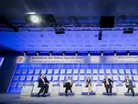Thought leaders at WEF Summit in Abu Dhabi

We are experiencing a fourth industrial revolution, according to thought leaders speaking at the World Economic Forum's Summit on the Global Agenda, taking place in Abu Dhabi this week.
The rapid proliferation of technologies - including artificial intelligence, biotechnology, robotics and 3D printing - that will have broad and deep impact on all aspects of life raises profound questions about the future, including major ethical challenges.
Bernard Meyerson, CIO and VP of IBM Corporation said: “Imagine being strapped on the front of a locomotive and going through a tunnel. You had better know if the light ahead is the light at end of the tunnel or an oncoming train. It is that kind of situation.”
Toomas Hendrik Ilves, President of Estonia, added: “The new industrial revolution differs from previous ones because the rate of growth is exponential. We are going to see an exponential increase in the power of the chip. Chip-based industrial technologies will grow faster and faster.”
The business opportunities raised by this new revolution are significant, said Lee Sang-Yup, Distinguished Professor and Director of the Korea Advanced Institute of Science and Technology (KAIST). He noted that businesses are now doing away with quarterly reporting and are instead reporting their financial positions monthly because the pace of change is so fast and one rival could eclipse another practically overnight.
The advent of this new industrial revolution is raising an enormous range of questions, including ethical challenges that will be difficult to answer. Consider issues relating to self-driving cars. Should they be programmed to avoid running into a group of pedestrians when the alternative is hitting a wall and possibly injuring the driver? There are many other ethical and security challenges, including privacy and data integrity, as well as the differential between those who have access and know how to use the technologies and those who do not.
The Summit on the Global Agenda 2015 brings together over 900 thought leaders and experts from business, government, civil society, academia and media who are among the members of the Forum’s network of over 80 Global Agenda Councils. They are focused on finding innovative solutions and approaches to key global challenges, such as achieving inclusive growth and addressing climate change and natural resources security.
Read the October 2015 issue of Business Review Europe and Middle East and follow @BusinessRevME



